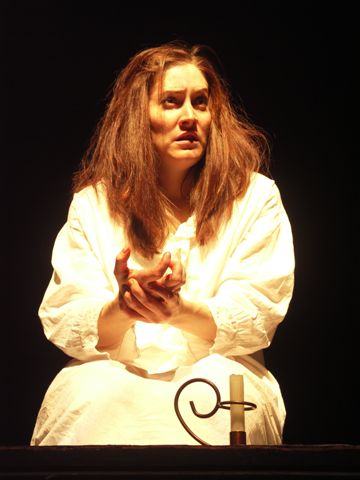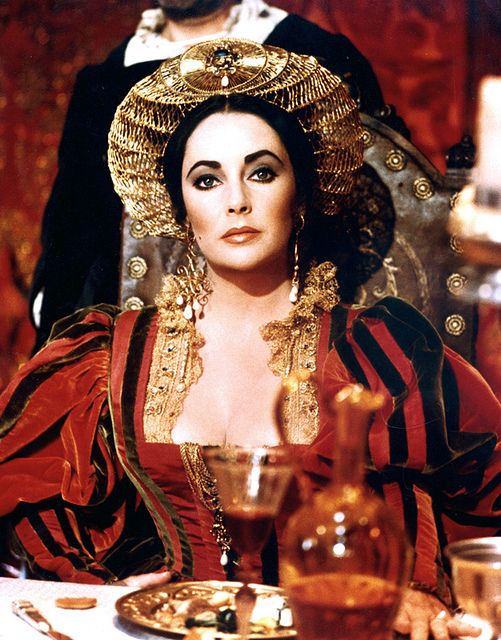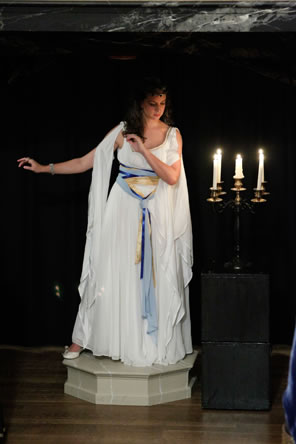Though he’s one of the world’s greatest playwrights, we don’t always look to Shakespeare for empowering female characters. In fact, despite our love for his work, we often struggle to defend many of them. For example, Kate in “Taming of the Shrew” starts off super strong at the beginning of the play, but by the end, she becomes submissive. There has been so much debate over the evolution of this one character because she broke from the mold so well up until the end of the play.
When looking to Shakespeare for strong characters to play or idolize, the first few that always come to mind are Hamlet or Richard II, since these are very meaty characters who have countless iconic lines. Many women would prefer to play Hamlet over Ophelia or play Prospero over Cressida. However, that’s not to say the women of Shakespeare are completely at a loss. There are many strong monologues by female characters throughout his work.
Whether it be for an audition or just for fun, here are eight great Shakespearean monologues for women:
1. Lady Macbeth Damned Spot, “Macbeth,” Act 5, Scene 1

When trying to think of a great female monologue from Shakespeare, this is the one that most often comes to mind. Lady M. has become one of the most iconic female characters in Shakespeare’s work. She’s far from innocent, and you can’t help but feel for her in this scene. This is perhaps one of the most, if not the most popular female monologue from Shakespeare.
Yet here’s a spot.
Out, damned spot! out, I say!–One: two: why,
then, ’tis time to do’t.–Hell is murky!–Fie, my
lord, fie! a soldier, and afeard? What need we
fear who knows it, when none can call our power to
account?–Yet who would have thought the old man
to have had so much blood in him.
The thane of Fife had a wife: where is she now?–
What, will these hands ne’er be clean?–No more o’
that, my lord, no more o’ that: you mar all with
this starting.
Here’s the smell of the blood still: all the
perfumes of Arabia will not sweeten this little
hand. Oh, oh, oh!
Wash your hands, put on your nightgown; look not so
pale.–I tell you yet again, Banquo’s buried; he
cannot come out on’s grave.
To bed, to bed! there’s knocking at the gate:
come, come, come, come, give me your hand. What’s
done cannot be undone.–To bed, to bed, to bed!
2. Ophelia’s Breakdown, “Hamlet,” Act 4, Scene 5

Getting the more well-known scenes out of the way, this is one of the greatest examples of a female having a breakdown in Shakespeare’s work. What is admirable about this scene is that it is not a very “woe is me” moment. This scene was not triggered by a failed romantic endeavor. Yes, Hamlet has been toying with Ophelia throughout the play up until this point and did tell her “get thee to a nunnery,” but she finally cracks when she loses her closest ally: her father. Though not a technical monologue, all of Ophelia’s lines combined in this scene make for a very dramatic read.
Where is the beauteous majesty of Denmark?
[Sings]
How should I your true love know
From another one?
By his cockle hat and staff,
And his sandal shoon.
Say you? nay, pray you, mark.
[Sings]
He is dead and gone, lady,
He is dead and gone;
At his head a grass-green turf,
At his heels a stone.
Pray you, mark.
[Sings]
White his shroud as the mountain snow,–
[Sings]
Larded with sweet flowers
Which bewept to the grave did go
With true-love showers.
Well, God ‘ild you! They say the owl was a baker’s
daughter. Lord, we know what we are, but know not
what we may be. God be at your table!
Pray you, let’s have no words of this; but when they
ask you what it means, say you this:
[Sings]
To-morrow is Saint Valentine’s day,
All in the morning betime,
And I a maid at your window,
To be your Valentine.
Then up he rose, and donn’d his clothes,
And dupp’d the chamber-door;
Let in the maid, that out a maid
Never departed more.
Indeed, la, without an oath, I’ll make an end on’t:
[Sings]
By Gis and by Saint Charity,
Alack, and fie for shame!
Young men will do’t, if they come to’t;
By cock, they are to blame.
Quoth she, before you tumbled me,
You promised me to wed.
So would I ha’ done, by yonder sun,
An thou hadst not come to my bed.
I hope all will be well. We must be patient: but I
cannot choose but weep, to think they should lay him
i’ the cold ground. My brother shall know of it:
and so I thank you for your good counsel. Come, my
coach! Good night, ladies; good night, sweet ladies;
good night, good night.
3. Beatrice Is Tricked, “Much Ado About Nothing,” Act 3, Scene 1

Though a shorter monologue, Beatrice couldn’t be left off this list. She is one of the feistiest and and admirable female characters that Shakespeare has produced. She has many crazy one-liners, including “It is so, indeed; he is no less than a stuffed man: but for the stuffing—well, we are all mortal.” This monologue occurs after she is tricked into believing Benedict loves her.
What fire is in mine ears? Can this be true?
Stand I condemn’d for pride and scorn so much?
Contempt, farewell! and maiden pride, adieu!
No glory lives behind the back of such.
And, Benedick, love on; I will requite thee,
Taming my wild heart to thy loving hand:
If thou dost love, my kindness shall incite thee
To bind our loves up in a holy band;
For others say thou dost deserve, and I
Believe it better than reportingly.
4. Katherine, “Taming of the Shrew,” Act 5, Scene 2

Though not the most empowering of strong female monologues from Shakespeare, this one is pretty infamous and well-written. Yes, this monologue requires a great deal of analysis to understand how this character got to this point when she started out more outspoken than Beatrice, but it’s still worth a read. Feel free to interpret this ending as you like.
Fie, fie! unknit that threatening unkind brow,
And dart not scornful glances from those eyes
To wound thy lord, thy king, thy governor.
It blots thy beauty as frosts do bite the meads,
Confounds thy fame as whirlwinds shake fair buds,
And in no sense is meet or amiable.
A woman mov’d is like a fountain troubled-
Muddy, ill-seeming, thick, bereft of beauty;
And while it is so, none so dry or thirsty
Will deign to sip or touch one drop of it.
Thy husband is thy lord, thy life, thy keeper,
Thy head, thy sovereign; one that cares for thee,
And for thy maintenance commits his body
To painful labour both by sea and land,
To watch the night in storms, the day in cold,
Whilst thou liest warm at home, secure and safe;
And craves no other tribute at thy hands
But love, fair looks, and true obedience-
Too little payment for so great a debt.
Such duty as the subject owes the prince,
Even such a woman oweth to her husband;
And when she is froward, peevish, sullen, sour,
And not obedient to his honest will,
What is she but a foul contending rebel
And graceless traitor to her loving lord?
I am asham’d that women are so simple
To offer war where they should kneel for peace;
Or seek for rule, supremacy, and sway,
When they are bound to serve, love, and obey.
Why are our bodies soft and weak and smooth,
Unapt to toil and trouble in the world,
But that our soft conditions and our hearts
Should well agree with our external parts?
Come, come, you forward and unable worms!
My mind hath been as big as one of yours,
My heart as great, my reason haply more,
To bandy word for word and frown for frown;
But now I see our lances are but straws,
Our strength as weak, our weakness past compare,
That seeming to be most which we indeed least are.
Then vail your stomachs, for it is no boot,
And place your hands below your husband’s foot;
In token of which duty, if he please,
My hand is ready, may it do him ease.
5. Helena’s Declaration, “All’s Well that Ends Well,” Act 1, Scene 3

This monologue is not only passionate, but it’s a great example of role reversal. It’s not often that a female character gets a lengthy monologue to declare her love for a man in the bard’s work. For example, even a character as strong as Beatrice in “Much Ado About Nothing” is often upstaged by Benedict.
Helena’s monologue here also comes very early on in the play and establishes her character. She is very aware of her status, but she knows what she wants and will do anything to achieve it. Weird body swap to consummate her marriage aside, in full Shakespearean fashion, this monologue sets the stage for a very interesting character.
Then, I confess,
Here on my knee, before high heaven and you
That before you, and next unto high heaven,
I love your son.
My friends were poor, but honest; so’s my love:
Be not offended, for it hurts not him
That he is lov’d of me: I follow him not
By any token of presumptuous suit;
Nor would I have him till I do deserve him;
Yet never know how that desert should be.
I know I love in vain, strive against hope;
Yet, in this captious and intenible sieve
I still pour in the waters of my love,
And lack not to lose still. Thus, Indian-like,
Religious in mine error, I adore
The sun, that looks upon his worshipper,
But knows of him no more. My dearest madam,
Let not your hate encounter with my love
For loving where you do: but, if yourself,
Whose aged honour cites a virtuous youth,
Did ever in so true a flame of liking
Wish chastely and love dearly, that your Dian
Was both herself and Love; O! then, give pity
To her, whose state is such that cannot choose
But lend and give where she is sure to lose;
That seeks not to find that her search implies,
But, riddle-like, lives sweetly where she dies.
6. A Rose by Any Other Name, “Romeo and Juliet,” Act 2, Scene 2

Yes, it is corny and extremely well-known, but this list would not be complete without Juliet. While Juliet’s monologue after her cousin’s death was a close second, this list just needed a brief monologue about love and the optimism that occurs after meeting a cute boy at a party.
O Romeo, Romeo! wherefore art thou Romeo?
Deny thy father and refuse thy name;
Or, if thou wilt not, be but sworn my love,
And I’ll no longer be a Capulet.
‘Tis but thy name that is my enemy;
Thou art thyself, though not a Montague.
What’s Montague? it is nor hand, nor foot,
Nor arm, nor face, nor any other part
Belonging to a man. O, be some other name!
What’s in a name? that which we call a rose
By any other name would smell as sweet;
So Romeo would, were he not Romeo call’d,
Retain that dear perfection which he owes
Without that title. Romeo, doff thy name,
And for that name which is no part of thee
Take all myself.
7. Spare Your Threats, “The Winter’s Tale,” Act 3, Scene 2

This play is often severely overlooked, as is the character of Hermione. The main issue with this play is that it’s hard to classify. Some say it’s a comedy, while others think it’s a romance. Though Hermione is not a main character throughout the whole play, the conflict between her and her husband drives the plot.
In this particular scene, she is defending herself after her husband has accused her of having an affair. She never once appears weak and holds her head high throughout the scene.
Sir, spare your threats:
The bug which you would fright me with I seek.
To me can life be no commodity:
The crown and comfort of my life, your favour,
I do give lost; for I do feel it gone,
But know not how it went. My second joy
And first-fruits of my body, from his presence
I am barr’d, like one infectious. My third comfort
Starr’d most unluckily, is from my breast,
The innocent milk in its most innocent mouth,
Haled out to murder: myself on every post
Proclaimed a strumpet: with immodest hatred
The child-bed privilege denied, which ‘longs
To women of all fashion; lastly, hurried
Here to this place, i’ the open air, before
I have got strength of limit. Now, my liege,
Tell me what blessings I have here alive,
That I should fear to die? Therefore proceed.
But yet hear this: mistake me not; no life,
I prize it not a straw, but for mine honour,
Which I would free, if I shall be condemn’d
Upon surmises, all proofs sleeping else
But what your jealousies awake, I tell you
‘Tis rigor and not law. Your honours all,
I do refer me to the oracle:
Apollo be my judge!
8. The Epilogue, “As You Like It,” Act 5, Scene 4

Like Lady Macbeth’s monologue, this one by Rosalind is also fairly well known. Rosalind is a big favorite as far as Shakespearean female leads go. She is strong, well-spoken and has a good deal of respect from those around her throughout the play. For those reasons, it’s not a surprise that she closes the play, though as she points out, “It’s not the fashion to see the lady the epilogue.”
It is not the fashion to see the lady the epilogue;
but it is no more unhandsome than to see the lord
the prologue. If it be true that good wine needs
no bush, ’tis true that a good play needs no
epilogue; yet to good wine they do use good bushes,
and good plays prove the better by the help of good
epilogues. What a case am I in then, that am
neither a good epilogue, nor cannot insinuate with
you in the behalf of a good play! I am not
furnished like a beggar, therefore to beg will not
become me: my way is, to conjure you; and I’ll begin
with the women. I charge you, O women! for the love
you bear to women–as I perceive by your simpering,
none of you hates them–that between you and the
women the play may please. If I were a woman I
would kiss as many of you as had beards that pleased
me, complexions that liked me and breaths that I
defied not: and, I am sure, as many as have good
beards or good faces or sweet breaths will, for my
kind offer, when I make curtsy, bid me farewell.








8 Comments
Leave a Reply